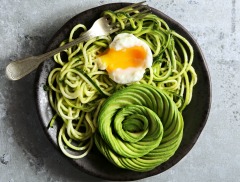Don't just meal plan... meal plan intelligently - with Meal Genius! Sign up for our free newsletter to get delicious recipes, sample meal plans and a whole lot more!
Peaches
Peaches are the third most popular fruit in the United States, just behind apples and oranges.
Widely planted across the eastern seaboard by the early settlers, there are dozens of varieies to choose from. The earliest cultivated varieties including Elberta, Hale, and Rio Oso Gem have the juiciest texture and can usually be found at organic farmers markets.
Peaches are a good source of vitamin C, and also provide boron, flavonoids and carotenoids.
Because peaches are on the Environmental Working Group's list of the most chemically contaminated foods - the Dirty Dozen - be sure to always pick organic.
Glycemic Index=42
Glycemic Load=5
Antioxidant Score (ORAC)=1,814
The Benefits
- Special diets: Autoimmune Paleo Diet, Elimination Diet, Gluten-Free Diet, Gluten-Free/Dairy-Free Diet, Grain-Free Diet, Low Acid Diet, Low Histamine Diet, Low Oxalate Diet, Low Starch Diet, Paleo Diet (Light), Paleo Diet (Strict), Pescetarian Diet, Primal Diet, Vegetarian Diet, Whole Food
- Excellent Source of:
- Good Source of: VitaminC
- Preferences: No Fish, No Red Meat, No Pork, No Eggs, No Shellfish, No Gluten, No Nuts, No Seeds, No Soy, No Dairy, No Poultry, No Molds, No Citrus, No Coconut, No Pseudograins, No Corn, No Yeast, No Peanuts, No Nightshade, No Legumes, No Grains, Low Carbohydrate, Low Cholesterol, Low Fat, Low Sodium, Low Saturated Fat
Related Foods
Selecting and Storing
Choose plump peaches with smooth skins and a pink or red "blush" on their cheeks. They should give slightly to gentle pressure and have a mild fragrance. Store ripe peaches in the refrigerator crisper where they will keep three to five days.









